Backed by a clear blue sky, the sun shone down as if to bless the events from on high. Thousands gathered along the streets and sidewalk. Speeches were given recounting the legacy of the brave men and women who sacrificed so much for the community. Families enjoyed picnics at the park. But the highlight for me was the parade.
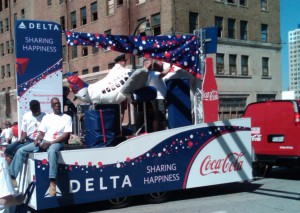 Corporate sponsors like Delta Airlines, Macy’s and Wells Fargo as well as local church congregations and politicians created eye-catching floats. Marching bands, beauty queens and costumed participants waved to the cheers of the crowd. For spectators and participants alike, it was a joyous jubilee.
Corporate sponsors like Delta Airlines, Macy’s and Wells Fargo as well as local church congregations and politicians created eye-catching floats. Marching bands, beauty queens and costumed participants waved to the cheers of the crowd. For spectators and participants alike, it was a joyous jubilee.
But more than just a parade, the celebration has become an annual ritual that brings the community together. The events of the day pay homage to ancestors who were persecuted by mobs while the government turned a blind eye or actively took part. These pioneers watched their leaders be killed and endured public ridicule and scorn for their peculiar beliefs and practices, particularly those related to non-traditional family structuring considered “unnatural” and “immoral” by the religious majority of the time.
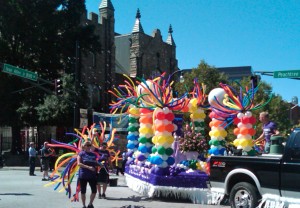 I couldn’t help but feel the joy of the community as I attended the parade for the 40th anniversary of Gay Pride in my city.
I couldn’t help but feel the joy of the community as I attended the parade for the 40th anniversary of Gay Pride in my city.
Before this year, I had always written off Pride as sort of a “gay party” that didn’t have anything to do with me because I am straight. But wanting to honor National Coming Out Day (today) and reading about the recent rash of suicides and bullying drew me to explore Pride for a better understanding of my gay brothers and sisters. I was surprised at what I found.
First, my stereotype of the event as “sex on a float” with suggestive acts parading in front of me was just wrong. Sure the drag queens represented, but so did children and families watching and walking.
More importantly, I discovered a similarity between these events and the way my own persecuted “peculiar” tribe commemorates our heroes on Pioneer Day.
There are drastic differences to be sure. But the underlying drive for the celebration, the spirit of camaraderie it brings to its members around the world, and the import that it carries for the community resonates with me.
Pride has familiar roots. It began in 1970 on the anniversary of the Stonewall Rebellion, a time when gays and lesbians fought back against the police who tried to round them up and put them in jail. Threatened by the government, they were put in a fight or flight position, something I can relate to considering my ancestors were subject to an extermination order.
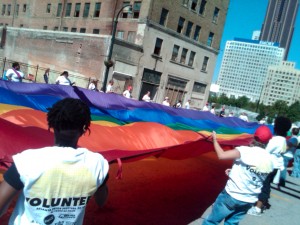 These ritual celebrations aren’t about finding outside approval. Mormons are still called cultists by some of our fellow Christians. Yet we celebrate who we are and what we have achieved. Once I learned about the history of Pride and experienced it first hand, it wasn’t such a stretch to see how meaningful these types of celebrations are for other communities as well.
These ritual celebrations aren’t about finding outside approval. Mormons are still called cultists by some of our fellow Christians. Yet we celebrate who we are and what we have achieved. Once I learned about the history of Pride and experienced it first hand, it wasn’t such a stretch to see how meaningful these types of celebrations are for other communities as well.
Next year, in addition to Pioneer Day, I plan to add Pride weekend as a celebration with my own children. I want them to see that bullying, whether by the government or by peers, is never the answer and that every community has heroes to champion.
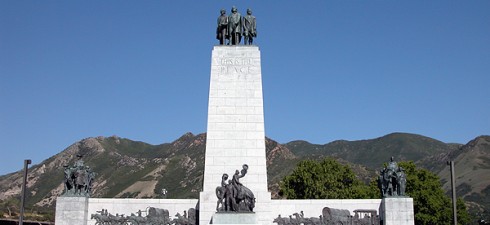
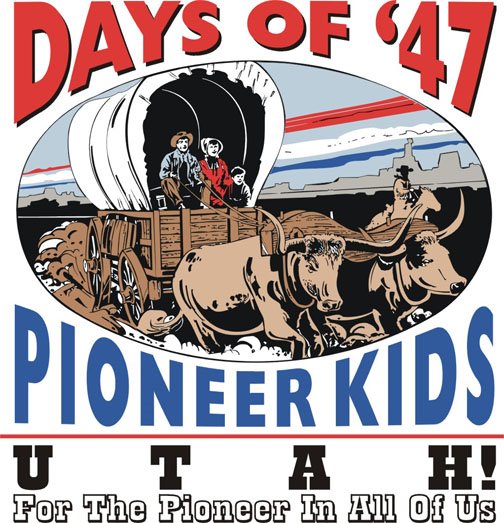
Yes, I do think it’s fascinating how these Pride parades, which were once very “campy,” have now become mainstream events, with participation by church groups, families, and the entire community. We didn’t have one in our community, but maybe next year I’ll come visit yours, and attend with you. Let’s do a “Mormons for Marriage” float!
You have me inspired! Both to celebrate Pioneer Day, and to hit SF this summer for the Pride parade.
I love the similarities you painted.. helped me to see the commonalities we share rather than identify GLBT people as ‘other.’ The parade sounds like it was a blast.
I love this, Mel. A great reminder of the many ways in which we humans are similar rather than the us vs. them rhetoric that seems to be the norm these days.
Mel! Talk about a plot twist!
One Sunday, not long after moving from SLC to the Seattle area, my little family went for a drive. We ended-up on Capitol Hill immediately following a Pride Day parade. In that moment in became vividly clear to me that we’d left Kansas behind. The kids got to ask questions which begged for mature answers and what a gift of broadening awareness in that moment.
Great comparison, Mel. Helen and I missed our local gay pride event this year, but we’re certainly going to try to go along and show our support for the next one. When we can celebrate with the most marginalised and discriminated-against members of our community, we celebrate as a community united.
Thanks for the comments. I think I went in thinking I’d be an outsider, even though I have friends in the LGBT community. But I was no more an outsider than not being in the military at a veteran’s day parade.
Most interesting to me, was when I looked at the Deseret News photos of last Pioneer Day parade, there were several images that could just have easily been in Pride. It showed me that the lens we’re looking through definitely colors our point of view.